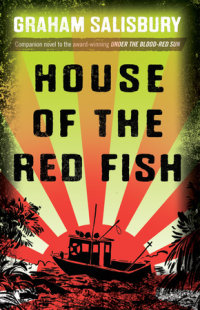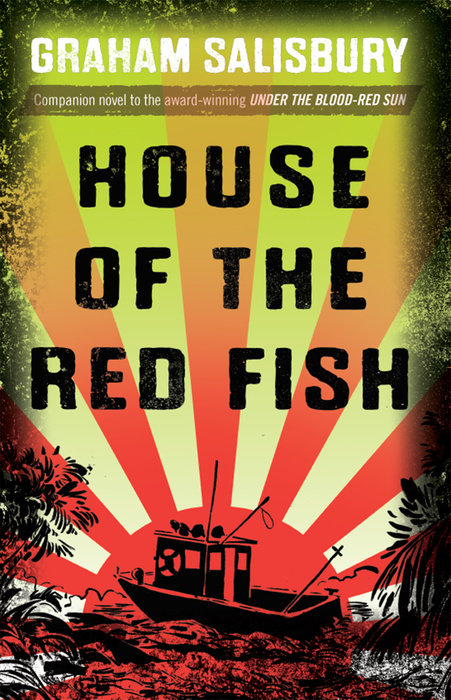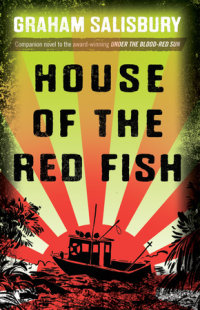in the before time
One Saturday morning in September 1941, three months before the Japanese bombed Pearl Harbor, the islands lay on the ocean as warm and peaceful as cats sleeping in the sun. Life was still good then, and I’d just started eighth grade at Roosevelt High School.
I woke with a jolt, threw on a pair of shorts and a shirt, and ran out of the house, letting the screen door slap behind me. “You need to eat something!” Mama called, coming up to peer through the screen.
“Later,” I said, turning to jog backwards.
She waved me off and sank back into the darkness of the house.
Papa was coming in today. He and his deckhand, Sanji, had been gone for a week, fishing for tuna somewhere beyond the blue horizon.
I jumped on a city bus and headed down to Kewalo Basin, the harbor where Papa kept his boat. When I got there the Taiyo Maru sat motionless alongside the pier, its fish unloaded and Papa and Sanji hosing down a…
in the before time
One Saturday morning in September 1941, three months before the Japanese bombed Pearl Harbor, the islands lay on the ocean as warm and peaceful as cats sleeping in the sun. Life was still good then, and I’d just started eighth grade at Roosevelt High School.
I woke with a jolt, threw on a pair of shorts and a shirt, and ran out of the house, letting the screen door slap behind me. “You need to eat something!” Mama called, coming up to peer through the screen.
“Later,” I said, turning to jog backwards.
She waved me off and sank back into the darkness of the house.
Papa was coming in today. He and his deckhand, Sanji, had been gone for a week, fishing for tuna somewhere beyond the blue horizon.
I jumped on a city bus and headed down to Kewalo Basin, the harbor where Papa kept his boat. When I got there the Taiyo Maru sat motionless alongside the pier, its fish unloaded and Papa and Sanji hosing down a week’s worth of fish slime. She was a beautiful boat, bright white to match her name—the Sun—a Japanese-style fishing sampan thirty-eight feet long.
“Heyyy,” Sanji said as I jogged up. “Look who’s here, boss. Better put um to work, ah? Make um more fast for me to get home to see my girls.” He meant Reiko, his wife, and their three-year-old daughter, Mari, the two people he lived for. Sanji was only nineteen, by far the youngest father I knew.
“Tomi,” Papa said, a big grin on his face. “We cleaning up. Come aboard.”
That was exactly what I wanted to do. To work with Papa and Sanji on the Taiyo Maru was one of my dreams. That and playing baseball. In all of life, what else was there besides boats and baseball?
Papa stood with his feet spread, coiling a rope. Dark brown from a lifetime on the sea, short haircut, baggy khaki pants. And that grin.
“You catch much?” I asked.
He wagged his eyebrows. “Best haul we ever had.”
“Ho, really?”
“Got lucky, this time. The guy counting us our money right now.”
Sanji tossed me a scrub brush.
An hour later, the boat was squeaky clean. All the equipment was stored in the hold, and the deck was free of fish slime and smelling good again. Sanji jumped off onto the pier and untied the lines. He tossed them over to me. “You know what to do with this ropes?”
“Pfff,” I said. “As good as you, any day.”
He laughed. “You dreaming, cockaroach.”
He looked up at Papa, still on the boat. “Hey, boss, try go get the small glass ball. I forgot um in the drawer by the deckhouse.”
Papa dug it out and held it up.
“That’s for you,” Sanji said to me. “I foun’ um about ten miles pas’ Kauai. Keep um. I give you.”
Papa handed me the glass ball.
“Ho, thanks, Sanji.” I held the green net float from Japan up to the sun. Every time I touched one I thought of that faraway country my family came from—Japan, trapped inside the glass, its mystery magnified by the sun. Every now and then you could find them in the ocean, or washed up on the beach. If this one had been covered with barnacles like usual, Sanji had cleaned them off. “Like a good-luck charm,” he said.
While Sanji went over to warm up his fish-stinky truck for the ride home, Papa and I walked the boat out into the harbor and tied it to its mooring, a white float chained to a giant block of concrete on the sand below.
Papa untied the small skiff he kept secured upside down on the bow. It made a plopping sound when he dropped it down onto the water. I eased over the side into it and set the glass ball on the floorboards. Papa handed me the wooden pigeon crate. He’d taken six of his pigeons to sea. “They all come home?” he asked.
“Right on time.”
Papa smiled and lowered himself into the skiff, rocking it gently. Every time he went to sea he’d take some of his racing pigeons a few miles out and turn them loose to find their way home. They always did. And fast. Their homing instinct fascinated Papa and me. How they knew just where to go was a mystery, like how some animals get antsy minutes before an earthquake.
I sat in the stern facing Papa as he rowed long, slow strokes back to the pier. He dipped his head. “Look at that boat.”
I turned back to gaze at the Taiyo Maru. She had an open deck with a small forward wheelhouse sitting on it like a queen. And a long-armed tiller that Papa often guided with his knee.
“It’s a good one,” I said.
“From way back in my younger days that’s what I dreamed about . . . right there.”
I studied it closer, this time noticing how it sat on the water, perfectly still and perfectly balanced, not tilting to one side like some boats in that harbor.
“It’s a good boat,” I said, unable to think of anything smarter to say.
Papa smiled and nodded.
Rowed.
Back at the pier Sanji helped us haul the skiff out and carry it over to the palm trees where the fishermen kept their skiffs. We turned it upside down and tucked the oars under it.
A man from the fish shed came out and handed Papa a wad of bills the size of a big fat riceball. “Good catch, Nakaji,” the guy said. “Do that again and you’ll be a rich man.”
“Already am,” Papa said, putting his hand on my shoulder.
The guy winked at me and left.
Papa counted the money, his lips moving soundlessly. Sanji turned away to give him privacy.
“Unn,” Papa grunted, handing Sanji his pay.
Sanji gaped. “This too much, boss.” He tried to give some of it back.
Papa waved him off. “You worked hard. Buy gas for that rattrap truck. Take home something nice for Reiko and Mari.”
Sanji ducked his head. “You too good to me, boss.”
The three of us squeezed into the small cab of the truck for the ride home, the shiny green glass ball in my hands winking in the sunlight. It was the perfect day—except for the fish stink.
A small price for all we had.
In the before time.


